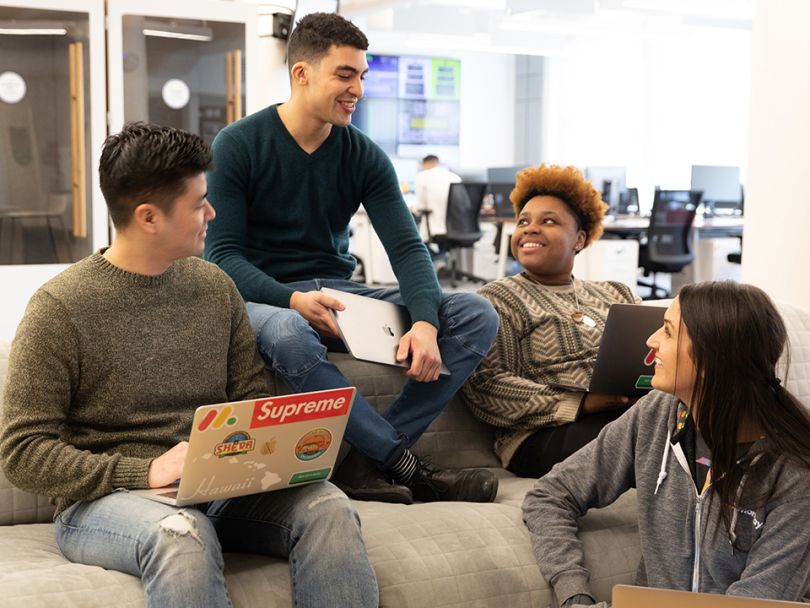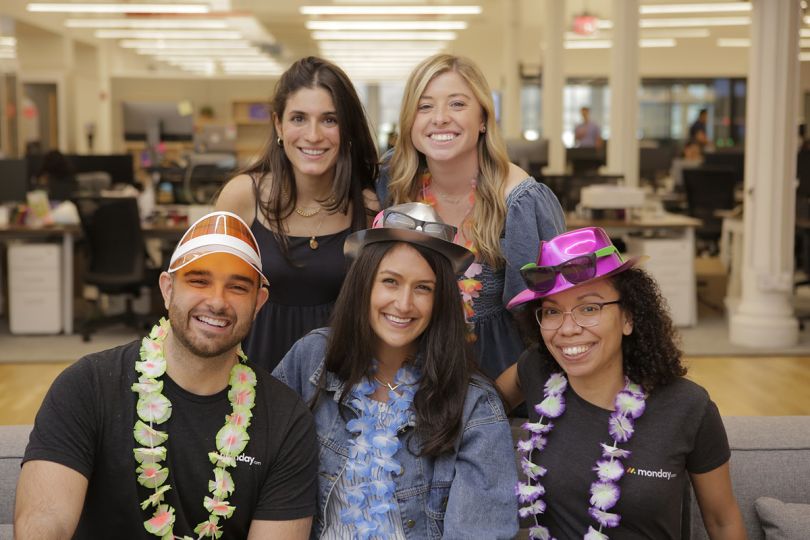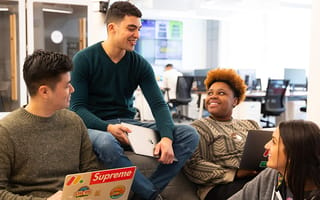Problems create tension. When our world is out of harmony, humans are incentivized by our brains to find a solution. When we succeed, an influx of dopamine crashes into the nucleus accumbens in our basal forebrain to create a brief sense of euphoria and relief. This is what makes a moment of clarity and insight so visceral.
The joy of solving problems is likely an evolutionary trait, passed down from ancestors who found innovative ways to outsmart ancient carnivores. It can be addictive for people like Heidi Crockett.
“When things work correctly, it’s boring. When things are broken, I need to figure out what’s going on. It’s very gratifying to be able to say, ‘I did it,’” said Crockett, who is a technical support engineer at monday.com.
Crockett has always loved critical-thinking tasks, from her education in chemistry and math to the part she plays on a team of sleuths working to hunt down solutions to intriguing customer problems at monday.com. The technical support team tackles mysteries, a perfect career for someone who loves the dopamine hit of solving problems. But that’s not the only personality trait that spells success for Crockett and her teammates.
“It takes someone who likes documenting things, solving things and processes,” said Crockett. “That is also something that’s really gratifying about this type of work.”

Technical support is a newer team at monday.com. Crockett was the second to join, and the group has since grown to 15 with more hires on the horizon. Technical support professionals handle complex client inquiries — issues with the API, app framework or security, for example — and conduct root-cause analyses to find creative solutions. It’s also a high-visibility role, where specialists are on the frontlines with clients and working across departments within the organization.
“Being a true partner and collaborator with the development, product, customer success and sales teams is a leadership opportunity,” said Technical Customer Experience Senior Manager Lucy Colgan.
Being part of a new team, technical support engineers have an opportunity to set precedent and establish team dynamics. “It really is building something from scratch, and the amount of influence that you can have is exciting. We’re looking for those people who see challenges as opportunities,” said Ariel Roitman, who’s a senior leader of the customer experience knowledge team.
Built In sat down with Crockett, Colgan and Roitman for more insider perspectives on what it’s like to build the technical support team at monday.com.
Tell me about the process of building this team from the ground up.
Ariel Roitman: We started with a very generalist approach. We had people who provided support across all areas of the platform and levels of complexity and knowledge. We realized that, in order to scale, we need professionals who have technical expertise and support as their focus and motivation.
Until recently, we had customer experience specialists in one team supporting the larger CX organization. They were handling escalations, some that were technical, some that were knowledge-related, which we now want to differentiate.
We’re collaborating closely because not everything is black and white. It’s very hard for one team member to have in-depth knowledge of every corner of the platform. We have people who are subject-matter experts on specific areas and are able to provide support to the team.
Lucy Colgan: The need for this team evolved when our product grew in complexity. We started to hear from customers who needed skilled technical partners to help them with certain challenges. Technical support is a customer-facing function. We have an additional, specialized level of knowledge, skills and training to help our end users with the technical questions that they have on the platform. We want people who love and are motivated by working with customers, but also people who are really interested in digging into complex challenges.
“We want people who love and are motivated by working with customers, but also people who are really interested in digging into complex challenges.”
Heidi Crocket: It takes a certain type of person to look at these inquiries and difficult problems as a mystery to solve. Before, we were taking our best customer experience people and asking them to handle bugs and technical aspects. As someone who came from the customer experience team and now is on this team, it’s fun to be around people who are as excited by the challenge as I am. I know they’re here to support me. Even though we’re specialized, we’re often borrowing from each other. For example, I specialize in automation and integration, so that’s API, but sometimes that crosses over to sign-in issues.
What is exciting or notable about working on this team?
Colgan: There are a lot of other companies out there that basically have one function. But what we provide is very customizable; monday.com is a vast product in terms of use cases as well as our customer base, which includes everyone from corporate organizations to mom-and-pop shops to nonprofits. What that offers, particularly for this role, is a diversity of work.
Roitman: We have a vision, and we are trying to build it. It’s a team effort. We want to build all of the day-to-day processes and make an impact in terms of actually shaping how a team will look, or how they will interact with different functions. There’s a lot of space for team members to shape what this team will look like and what our approach to our customers will be.
What are the career benefits of this kind of role, and how does it differ from other tech roles?
Crockett: Something that’s been really exciting to me is the number of different departments I get to work with at monday.com. On any given day I might be working with our customer success group, developers or our knowledge base. And then I get to work with customers. It’s helped me so much in developing leadership abilities, learning how to be a part of a discussion and taking on different roles.
“It’s helped me so much in developing leadership abilities, learning how to be a part of a discussion and taking on different roles.”
Colgan: You’re really working across a multitude of users and developing solutions for customers. That’s a very valuable skill. This role not only touches, but directly works with and is visible to many other parts of the organization. Also, tech roles are often in the background, and you don’t feel the impact that you’re making. In this role, you do have that direct connection, feeling the impact internally and externally.
How does the team’s specialization support the scaling of the monday.com product?
Colgan: When the company started out, our co-founders really believed that the product should be intuitive enough that customers could start using it right away. They didn’t want a high barrier to entry in the market. That has been a guiding principle for our design and development. Internally, we also set ourselves up to be that way. At the beginning, we were generalists approaching the product: A customer came to us with a question, and we were able to answer any type of question.
But as the company scaled, we started to see the need for specialization, and that actually kicked off with our developers. They wanted to form groups of developers that were deeply knowledgeable in the mechanisms of a certain area of the product. We saw how that evolved and worked really well. In building this team, that’s how we’re looking to align ourselves. The idea is twofold: It’s vital that we support our customers, but that means that we also need to support our team members and develop in-depth knowledge and skills. That way they’re talking to a subject-matter expert about their technical questions.

What is the culture like on the team?
Roitman: Ownership is really important. We check our egos at the door and collaborate. What makes the work environment so great is the people. We’re all very much impact-driven. Candidates often perceive that we’re a huge company, and assume everything is perfectly defined, but there are many aspects we’re working on that are still very startup-like. It can be challenging, but that’s what I connect to the most.
“Ownership is really important. We check our egos at the door and collaborate.”
Colgan: The overall company culture drives this, but being part of a new team does, too. We welcome feedback and new ideas. There are a lot of challenges in our business and operations. We genuinely look at those as opportunities to improve.
That growth mindset is something that we really look for in candidates. Are you somebody who is honest, vulnerable and real about a challenge, and then takes that as an opportunity to propose a solution or work with another stakeholder to build a better process? That’s something we really value. We are not an organization where you have to be at a certain level or on a certain team to make an impact. We run our business on monday.com and we can sometimes be the first users to spot issues or to understand inefficiencies.
Finally, we don’t take ourselves too seriously. It’s definitely a culture where you can make a mistake and learn from it, but there’s also a definite time and place for fun and lightheartedness.
Crockett: The technical support team is very small, and a lot of us have never met each other in real life. We have a Slack group chat where we talk to each other every day. We’re going to our off-site in Tel Aviv in July, and we’re even extending our trip through the weekend to hang out together at an Airbnb. We have built a very strong friendship. So when someone isn’t doing their best, teammates step up and say, “I’ll help. I’m your friend, not your colleague, today. How can I better support you?”
What would you say to those considering a technical support role at monday.com?
Crockett: It is a new and growing team, and the product is always changing. There are lots of different specializations and interests you could work on. But we’re a group that’s still very much figuring out how we’re going to build this team and what we want it to be. It is a growth opportunity for someone who wants to start or continue building their tech support career in a place where they will be supported by an evolving team.








